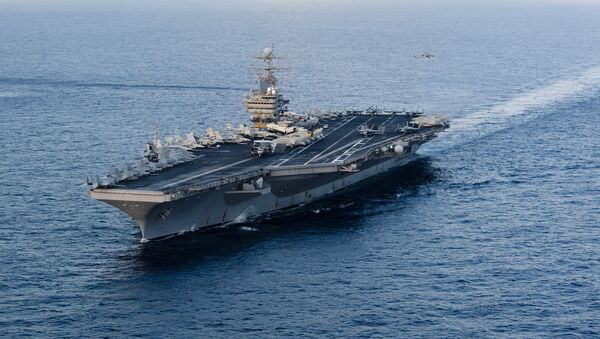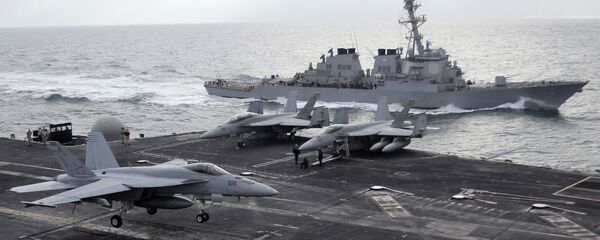The US decision to dispatch an aircraft carrier to the Middle East was made amid “clear indications” that Iranian forces were allegedly preparing to attack American forces in the region, an unnamed defence official told the Associated Press.
READ MORE: Price Drop: Iran Pulls Out Stops to Sell Oil to Counter US Sanctions — Minister
The source claimed that the Pentagon had green-lit the deployment and that US forces at sea and on land were suspected to be the potential targets.
The report comes shortly after White House National Security Adviser John Bolton said in a Sunday statement that Washington was deploying the USS Abraham Lincoln Carrier Strike Group and a bomber task force to the US Central Command region, which includes the Middle East.
Bolton claimed that the decision was made in response to a “number of troubling and escalatory indications and warnings” and that Washington wants to send a “clear and unmistakable message” to Tehran that it will unleash “unrelenting force” in the event of any attack on US interests or on those of its allies.
“The United States is not seeking war with the Iranian regime, but we are fully prepared to respond to any attack, whether by proxy, the Islamic Revolutionary Guard Corps, or regular Iranian forces”, he said.
The Trump administration has earlier upped the ante against Iran, having vowed to cut its oil exports to zero, thus prompting the Islamic Republic to warn that it will close the Strait of Hormuz, which is a strategic waterway linking Mideast crude producers to crucial world markets.
READ MORE: US Plans to Announce New Set of Sanctions Against Iran – Reports
Iranian Foreign Minister Javad Zarif has stressed that Tehran doesn’t seek to escalate tensions with Washington, but it will not allow the US to undermine the security of the Persian Gulf.
“We have been very clear that we have no interest in escalation. We have been clear that the Persian Gulf and the Strait of Hormuz are our lifeline. We depend on them for our livelihood, and we want them safe, secure, and free for navigation of all countries, including Iran. As we have stated before, Iran won’t permit the US to threaten the Persian Gulf”, the minister warned.
Last month, US President Donald Trump announced his decision not to reissue waivers on Iranian oil once they expire in May in a bid to bring the country’s crude exports to zero.
In addition, the US recently designated Iran’s Revolutionary Guard Corps as a terrorist group, which caused the Iranian parliament to ratify a bill which labelled the US Central Command a terrorist organisation.
The Trump administration imposed sanctions on Iran’s oil industry in November after the US unilaterally withdrew from the 2015 nuclear deal, which saw anti-Tehran restrictions lifted in exchange for the Islamic Republic maintaining the peaceful nature of its nuclear programme.
Having decided to reinstate all sanctions and slap new ones on Iran’s shipping, energy, financial, and other sectors, Trump pledged to introduce secondary restrictions on foreign companies doing business with Tehran, which drew much condemnation from other signatories to the nuclear deal.




